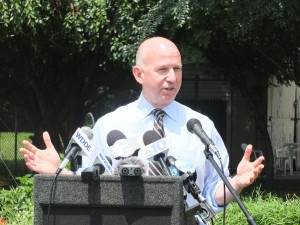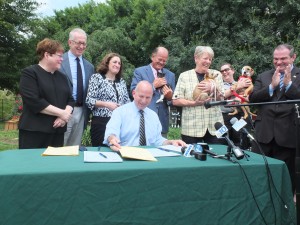Wilmington, DE – Animal welfare advocates, legislators and shelter animals flanked Governor Markell as he signed four animal protection bills today at the Delaware Humane Association in Wilmington. The new laws establish oversight and training programs for animal shelters and animal control officers and prohibit shelters from using gas chambers. In addition, trained personnel must evaluate animals seized in criminal activity, cruelty, and animal fighting for adoptability, instead of automatic euthanasia.

“These new policies further protect animals and people who are vulnerable in our community,” Governor Markell said. “It is a tremendous step forward for Delaware, thanks to collaboration among the Delaware General Assembly, pet owners, shelter officials, animal welfare advocates, enforcement personnel, and government officials.”
Governor Markell recognized state legislators, the Animal Welfare Task Force, a variety of animal protection organizations, and other advocates for their hard work and commitment to increasing animal protections in Delaware.
“The Office of Animal Welfare became part of the Department of Health and Social Services a year ago, and often in my work I see how important animals are to people,” said DHSS Cabinet Secretary Rita Landgraf. “From pet therapy dogs and cats in nursing homes and hospitals, to guide dogs for people with disabilities, tothe everyday family pets looking for homes, across the spectrum, animals truly deserve our respect and protection.”
Senate Bill 201 (sponsored by Sen. Blevins, Sen. Peterson, Rep. Jaques and Rep. Kim Williams) tasks the Department of Health and Social Services, through the Office of Animal Welfare, with the management of the Shelter Standards Law, state Spay/Neuter Program and Fund, and Companion Animal License Plate fund, as well as clarifies the authority of the Department of Agriculture over poultry and livestock species and zoonotic disease prevention, eradication and mitigation.
House Bill 311 (sponsored by Rep. Jaques, Rep. Kim Williams, Sen. Blevins, Sen. McBride and Sen. Peterson) ensures all Animal Control Officers and Animal Cruelty Investigators are adequately trained by an approved training program and certified by the state to operate in Delaware.
“Companion animal issues are finally getting the much-needed attention they deserve,” Sen. Blevins said. “We now have the ability to provide oversight to programs and facilities that handle thousands of animals every year, and to develop training and resources that support those enforcing animal protection laws.”
Over the next several months, OAW will draft procedures and regulations for SB 201 and HB 311 that concern shelter inspections, complaint investigation, and animal control officer certification.
Added Hetti Brown, OAW Director in the Division of Public Health, DHSS, “Thank you to everyone who worked so hard on these bills today and the many partners who made the Office of Animal Welfare and these bills possible.”
Senate Bill 245 (sponsored by Sen. Peterson and Rep. Jaques) protects animals seized in criminal activity, cruelty and animal fighting from automatic euthanasia, instead allowing for evaluation of animals for adoptability by trained personnel. The bill also ensures that individuals involved in the criminal activity are prohibited from adopting the animals after their seizure or forfeiture. Best Friends Animal Society, a national animal advocacy organization, encouraged the passage of SB 245, citing Delaware as one of 13 states that still mandated the destruction of seized dogs associated with fighting, without considering the behavior of each dog.
House Bill 297 (sponsored by Rep. Dennis E. Williams and Sen. Peterson) clarifies when an animal control constable or dog warden may impound a dog that is suspected of being dangerous or potentially dangerous. HB 297 strengthens the existing Dangerous Dog Law. Rep. Dennis E. Williams credited 8-year-old Riley Hoverof Talleyville, who survived a 2012 attack bythe pet of a family member in Delaware, for inspiring him to sponsor HB 297.

Statements from prime sponsors of the legislation
Senate President Pro Tem and Chair of the Animal Welfare Task Force Patricia Blevins (D – Elsmere) on Senate Bill 201: “This law breathes life into the hard work of our animal welfare task force because it gives the Office of Animal Welfare the tools it needs to ensure that our shelters are up to standard and that our other animal safety measures are being enforced. I am confident that the office will do the hard work needed to ensure that our animals are safe and being treated well.”
Representative Earl Jaques (D-Glasgow) on House Bill 311: “For a number of years, we have been trying to re-establish the Office of Animal Welfare under the Division of Public Health so we can better protect those who can’t protect themselves – our pets. This new law makes sure that our Animal Control and Animal Cruelty officers are well-trained to handle the myriad problems they face in our communities and across our state.”
Senator Karen Peterson (D-Stanton) on Senate Bill 245: “There is no reason whatsoever that we should immediately condemn animals that have been victimized by cruelty or that have been forced into the fighting ring to death. With this law, we are going to evaluate these animals to see if they can be adopted into a caring family before taking other actions and doing our best to ensure they do not fall into criminal hands where they can be further abused.”
Representative Dennis E. Williams (D-Claymont/Talleyville) on House Bill 297: “We were faced with a situation where Animal Control officials said state law was unclear about how to handle dangerous dogs and they were unable to take action. It is unconscionable to think that we could have situations like this occur – with residents afraid to let their children play outdoors – and Animal Control was unable to do something about it. While we can’t turn back the clock to undo the attack on Riley and others, this new law will allow Animal Control to take action against dangerous dogs like this and protect residents by preventing future attacks.”